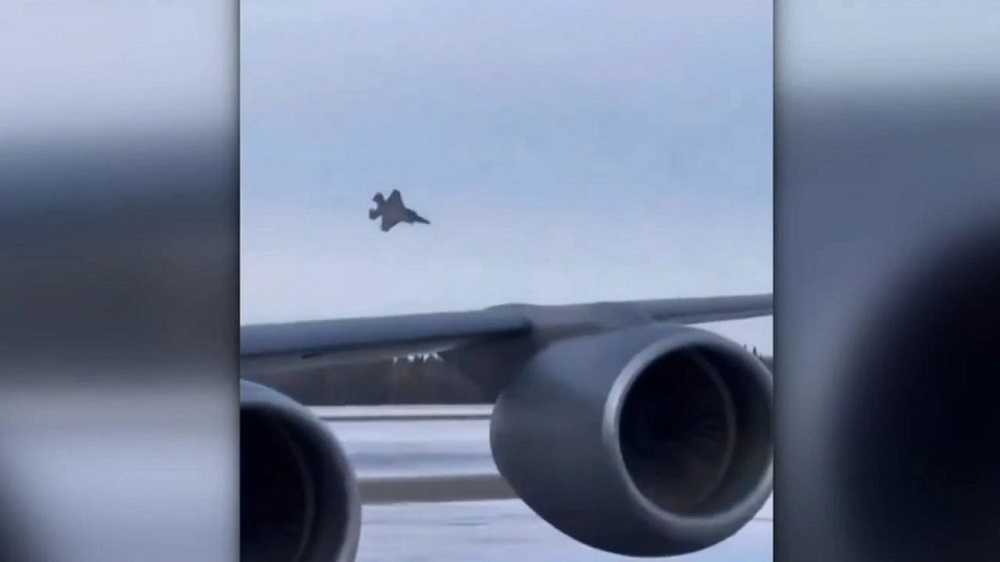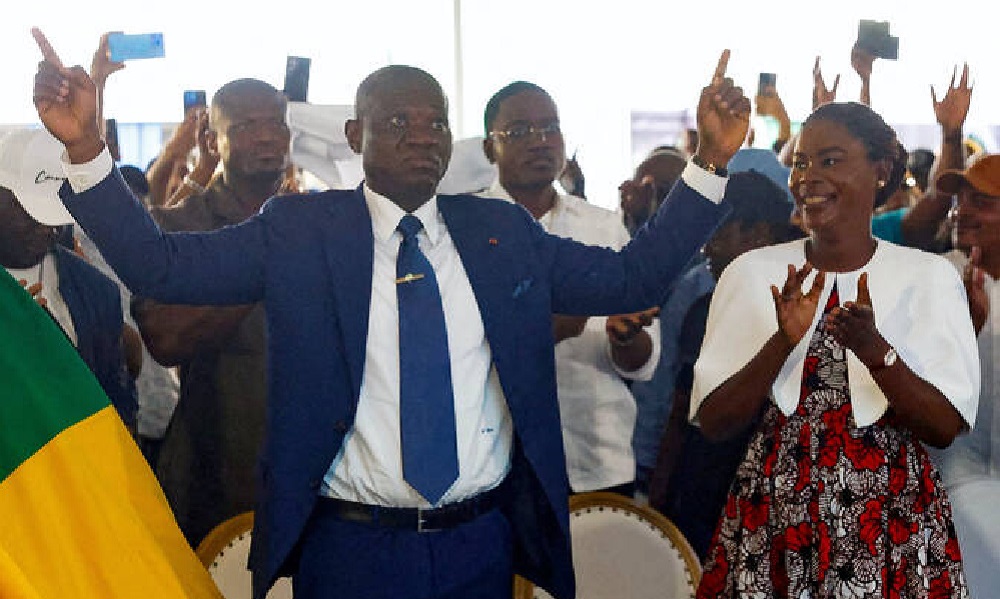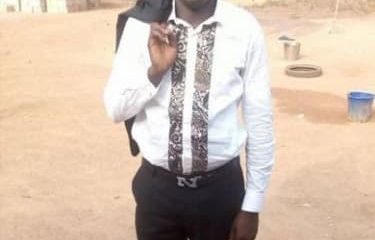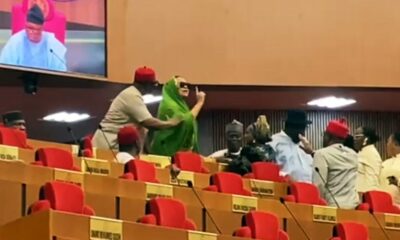Foreign
US Fighter Jet Crashes At Air Force Base

An Air Force pilot is safe after ejecting out of an F-35 fighter jet that then crashed at the Eielson Air Force Base in Alaska on Tuesday.
The incident occurred around 12:49 p.m. local time and the cause is under investigation, according to base commander Col. Paul Townsend. The jet was on a training mission and was getting ready to land when “an in-flight emergency occurred,” the Air Force said in a statement Wednesday.
The pilot, who was not identified, was transported to Bassett Army Hospital and has since been released.
“We are grateful that the pilot is safe. Our team’s professional and expeditious response to the crash was instrumental in mitigating risk to personnel,” Townsend said Wednesday in a statement. “We appreciate all of the support we are receiving and remain committed to supporting U.S. Air Force investigation efforts.”
A dramatic video of the incident quickly circulated online showing what appears to be the F-35 fighter jet twirling toward the ground before exploding on impact. A deployed parachute can be seen slowly floating down in the background. An Air Force spokesperson later confirmed the video’s authenticity to CBS News.
“Our people are our most important resource, and we are committed in ensuring their safety and security,” Townsend said in a statement. “I can assure you the United States Air Force will conduct a thorough investigation in hopes to minimize the chances of such occurrences from happening again.”
The F-35 fighter jets operated by the U.S. Air Force are replacing the army branch’s aging fleet, according to the Air Force’s website. They are also deployed by the Navy and the Marines. Each aircraft costs about $100 million.
Last year, a Marine Corps investigation into an F-35 fighter jet that went missing in 2023 had flown for 11 minutes after the pilot ejected before it crashed. An investigation found that incident was the result of pilot error.
Foreign
Gabon military leader Nguema wins presidential election

Gabon’s junta chief, Brice Oligui Nguema, has won the presidential election with 90.35 per cent of the vote, according to provisional results released Sunday by the interior ministry.
Oligui, who ended more than five decades of corruption-plagued rule by the Bongo family in August 2023, assuming the role of transitional president, had promised to return the country to democratic rule.
Earlier Sunday, Gabon 24 television had reported that he was “well ahead” in several of the central African country’s provinces.
On Saturday, voters had flocked to the ballot boxes to have their say in an election marking the end of military rule. The latest provisional figures from the interior ministry put the participation rate at 70.4 per cent.
The day after voters poured into polling stations, the streets of the capital Libreville were calm — in contrast with previous elections in 2016 and 2023 marked by tensions and unrest.
“I hadn’t voted in a long time, but this time, I saw a ray or something that made me go out and vote,” 58-year-old Catholic Olivina Migombe told AFP while en route to church on Sunday.
“I believe in change this time,” the professed Oligui voter added.
– Debt and poverty –
Whoever wins will have to reckon with the oil-rich country’s litany of problems, from crumbling infrastructure to widespread poverty, all while labouring under a crushing mountain of debt.
If Oligui is elected president “he will have lots of work to do,” Patrick Essono-Mve, a 48-year-old unemployed technician, also on the way to mass, told AFP.
Oligui has sought to shed his military strongman image and even ditched his general’s uniform to run for a seven-year term.
The junta leader has dominated the campaign, with his seven challengers, led by ousted leader Ali Bongo’s last prime minister, Alain-Claude Bilie By Nze, largely invisible by comparison.
But critics accuse Oligui of having failed to move on from the years of plunder of the country’s vast mineral wealth under the Bongos, whom he served for years.
For the first time, foreign and independent media were allowed to film the ballot count.
International observers at polling stations across the country did not notice any major incidents, according to first reports.
In total, some 920,000 voters were called to cast their ballots at 3,037 polling stations, of which 96 were abroad.
Already, in the first results released by state media CTRI News on Sunday morning, Oligui was the overwhelming favourite to win in around 30 polling stations, some of them returning results of 100 percent of the vote in his favour.
AFP
Foreign
Trump urges Russia to ‘get moving’ on Ukraine as Witkoff meets Putin

US envoy Steve Witkoff wrapped up his latest talks with Russia’s Vladimir Putin on Friday, after President Donald Trump urged his Russian counterpart to move quicker to end what he said was the country’s “senseless war” with Ukraine.
Trump has been pressing Moscow and Kyiv to agree on a ceasefire deal but has failed to extract any major concessions from the Kremlin, despite repeated negotiations between Russian and US officials.
The US leader told NBC News last month he was “pissed off” with his Russian counterpart, while top US diplomat Marco Rubio warned last week that Washington would not tolerate “endless negotiations” with Russia over the conflict.
“Russia has to get moving,” Trump wrote on his Truth Social platform, adding that the conflict, which began in February 2022 when Moscow sent troops into Ukraine, was “senseless” and “should have never happened”.
Kyiv and several of its Western allies suspect Russia of stalling the talks on purpose.
Ukraine’s President Volodymyr Zelensky has accused Russia of dragging Beijing into the conflict and on Friday claimed that hundreds of Chinese nationals were fighting at the Ukraine front line alongside Russian troops.
Trump’s post came just before Witkoff’s meeting with Putin at the presidential library in Saint Petersburg, which state news agencies said lasted four and a half hours.
The Kremlin said afterwards only that the meeting had taken place and “focused on various aspects of the Ukrainian settlement”, without elaborating.
Spokesman Dmitry Peskov had said earlier that he expected no diplomatic “breakthroughs” from the talks — Witkoff’s third with Putin since February.
He also said “maybe” to a question about whether a possible meeting between Putin and Trump would be discussed.
– Kellogg’s ‘zones of responsibility’ –
After their last meeting, Witkoff — a long-time Trump ally who worked with the US president in real estate — said Putin was a “great leader” and “not a bad guy”.
The envoy’s praise of a president long seen by the United States as an autocratic adversary highlights the dramatic turn in Washington’s approach to dealings with the Kremlin since Trump took office for a second term.
Despite a flurry of diplomacy, there has been little meaningful progress on Trump’s main aim of achieving a ceasefire.
Keith Kellogg, Trump’s special envoy to Ukraine, suggested British and French troops could adopt zones of control in the country, in an interview with The Times published Saturday.
Kellogg suggested they could have areas of responsibility west of the Dnipro river, as part of a “reassurance force”, with a demilitarised zone separating them from Russian-occupied areas in the east.
“You could almost make it look like what happened with Berlin after World War II,” he told the British newspaper.
“I was speaking of a post-ceasefire resiliency force in support of Ukraine’s sovereignty. In discussions of partitioning, I was referencing areas or zones of responsibility for an allied force (without US troops),” he said later on X.
– ‘Using Chinese lives’ –
Kyiv said this week that its forces had captured two Chinese nationals in the eastern Donetsk region fighting for Moscow.
The Kremlin denied the claim, while Beijing warned parties to the conflict against making “irresponsible remarks”.
“As of now, we have information that at least several hundred Chinese nationals are fighting as part of Russia’s occupation forces,” Zelensky told military chiefs from allied countries in Brussels.
“This means Russia is clearly trying to prolong the war — even by using Chinese lives.”
The Ukrainian leader also called out Russia for having refused a complete ceasefire proposed by the United States with Ukrainian approval a month ago.
Putin last month rejected a full and unconditional pause in the conflict, while the Kremlin has made a truce in the Black Sea conditional on the West lifting certain sanctions.
– Question of trust –
Trump has pushed for a broad rapprochement with Moscow, which has yielded some results.
On Thursday, Russia freed dual US-Russian ballet dancer Ksenia Karelina from prison in exchange for suspected tech smuggler Arthur Petrov, the second exchange between Moscow and Washington in less than two months.
Karelina, arrested last January while visiting Russia to see family, was serving a 12-year sentence on “treason” charges after she donated the equivalent of around $50 to a pro-Ukraine charity.
The head of Moscow’s foreign intelligence service, Sergei Naryshkin, said Friday that Russia would discuss more prisoner swaps in the future.
Russian Foreign Minister Sergei Lavrov said the swaps helped build confidence between the two sides, which deteriorated under former US president Joe Biden’s administration.
“It helps build trust, which is much needed, but it will take a long time to finally restore it,” he told reporters.
AFP
Foreign
FG, stakeholders commend EU over disability rights funds

*Decry USAID funding cut
By Francesca Hangeior
The Federal Government and stakeholders, has applauded the European Union for funding a project aimed at advocating the rights of Persons with Disability in the wake of the halt in funding by the United States Agency for International Development.
They gave the tributes at the official launch of the Disability Rights Advocacy Project for Inclusive Development, a three-year initiative co-funded by the EU in collaboration with the Christian Blind Mission held in Abuja.
The Executive Secretary of the National Commission for Persons with Disabilities, Ayuba Burki, described the project as a welcome development.
He said, “This project is very commendable. As it is a three-year project, it is our desire that this will go as planned for all persons with disability to be involved. Disability programmes are not exclusively the purview of some persons in organisations.
“It means all hands must be on deck, and we must achieve our set goals. So I am delighted and look forward to a successful implementation of this programme in the next three years. We call on other partners to follow suit so that at the end of the day, people living with disabilities can heave a sigh of relief.”
Burki also rued the funding cut of USAID by United States President Donald Trump, saying it will put pressure on many third-world countries.
He also sees it as an opportunity for leaders in the affected countries to look inward and find solutions.
“I will call on African leaders to take up this challenge and look inward. I believe that USAIÐ was doing a great job. But we cannot abandon caring for our people because it pulled out. We need to look inward and re-strategise.
“Who knows? This may be a blessing in disguise. So I don’t see a cause to worry. But it is an opportunity to look inward and solve funding and reprioritise our priorities as a nation. We will be fine at the end of the day,” he stated.
The Founder of The Albino Foundation, Chief Jack Epelle also shared his sentiments.
Epelle warned that Nigeria and many other developing nations cannot continue to depend on USAID funding forever.
He said, “I think it’s a good and bad omen. It is a good omen because it is high time we begin to take our eyes off development funding and begin to develop ourselves so that we, in turn, can fund others. This kind of event should propel us to look inward and begin to see how to meet the needs of the people by ourselves.
“The bad omen is that there are projects USAID has started and individuals were employed. Some projects were expected to run for three to five years. It will create hardships. Several children will be out of school, and many families not sure of where their next meal will come will suffer.”
He, however, praised the European Union for agreeing to undertake the advocacy of persons with disabilities, especially at the grassroots.
Earlier in his address, the CBM Global Head of Programme Implementation, Bright Ekweremadu, said the project couldn’t have come at a better time.
Ekweremadu also hailed the EU for taking up the bold initiative to continue funding humanitarian projects at a time when President Donald Trump halted USAID funding in Africa and other regions.
He said, “We all know what recently happened to USAID. So when you see a global donor or funder for programmes like this, we need to prostrate and think of them for coming to the aid of the less privileged and vulnerable in society.
“Today is a bold declaration of purpose in a shared commitment to a future where every Nigerian, regardless of their ability, has a right to dignity, opportunity and full participation in the society.
“It is our collective response to the persistent inequalities that persons with disabilities face every single day of their lives, sometimes consciously from us. Together, let us build a Nigeria where disability will be recognised, every voice will be heard, and no one is left behind.”
While appreciating the gesture from the audience, the head of the European Union delegation, Wynyfred Egbuson, emphasised the need to advocate for the cause of the less privileged in society.
According to her, the EU-CBM project was signed after a conscious and rigorous exercise of assessing its possible impact.
She said, “Today’s event is an outcome of the long process that started in June 2024 with a call for proposals by civil society organisations and human rights organisations within and outside Nigeria through a competitive and rigorous process that entails three stages of assessment.
“The CBM and its co-implementing partners were selected from 31 applications, leading to the project being launched today. It is estimated that over 25 million people live with disability in Nigeria. This translates to one in every 10 Nigerians.
“Unfortunately, persons with disability are among the most vulnerable members of our society. They face social stigma, exploitation, discrimination and exclusion from participating in the society. We believe that a lot still needs to be done.”
-

 News21 hours ago
News21 hours agoFire engulfs presidential villa
-

 News16 hours ago
News16 hours agoTinubu’s ugly past shores up as US Judge orders DEA, FBI to release files
-

 News21 hours ago
News21 hours agoBig waste! Man with PhD in Maths works as cleaner, messenger in Nigerian University
-

 News5 hours ago
News5 hours agoAutonomy: 774 LGs challenge FG, states in court Tuesday
-

 Sports15 hours ago
Sports15 hours agoJust in: Newcastle pummel Man United 4-1
-

 Education21 hours ago
Education21 hours agoJAMB releases 2025 mock UTME results
-

 News15 hours ago
News15 hours ago2027: Atiku’s Opposition Front is a mission impossible-Wike declares
-

 Economy21 hours ago
Economy21 hours agoSEE Current Black Market Dollar (USD) To Naira (NGN) Exchange Rate

















